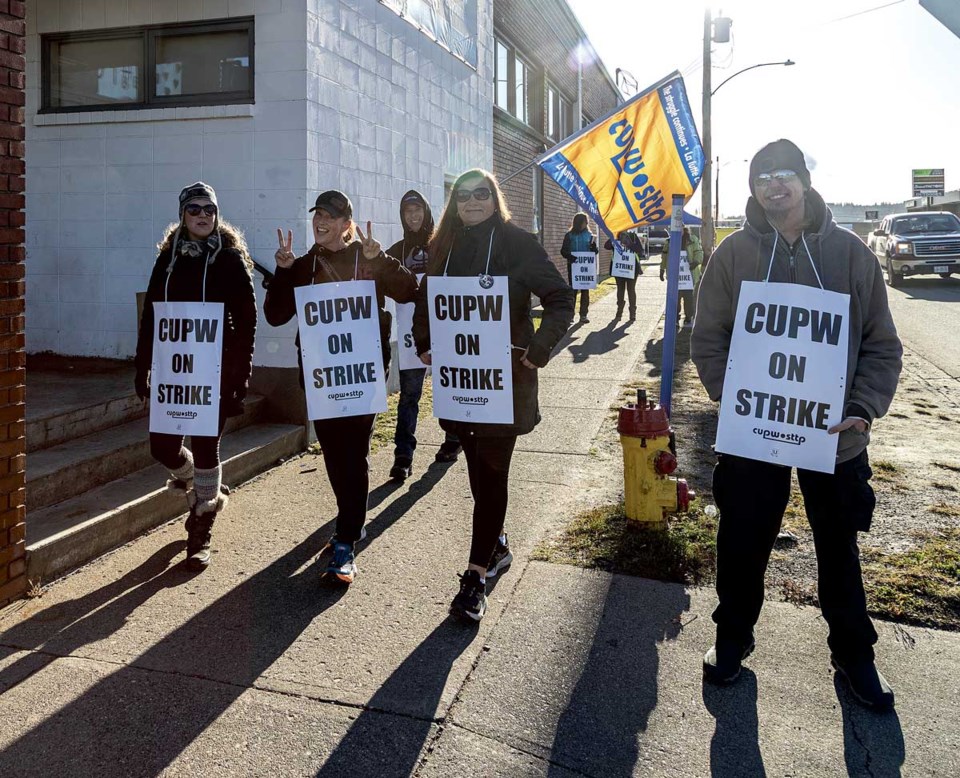Canada Post union members will face a significant decision starting Monday, July 21.
The Canadian Union of Postal Workers (CUPW), which represents more than 50,000 members across the country, is voting on what their employer, Canada Post, is calling its “best and final” offer.
Voting will take place from July 21 to Aug. 1. The offer includes a 13 per cent wage increase over four years, a $1,000 signing bonus for full-time employees, and other proposed benefits.
However, CUPW members in Prince George plan to overwhelmingly reject the offer, according to Nicole Chouinard, president of the Prince George local union.
“A 'no' vote is really the only option for us — both for ourselves and for the labour movement in this country as a whole,” said Chouinard. “If we voted yes, even if we agreed with it, we would be sending a message to the federal government that they can intervene and step on our Charter rights and disregard the labour movement. That’s not OK under any circumstances.
“The National Executive Board recommends what they feel is in our best interest, and they are saying this is not in our best interest. For Canada Post and the government to say we should have to vote on it is borderline criminal.”
Chouinard said the Government of Canada has interfered in the bargaining process, particularly through delays stemming from a recent Industrial Inquiry Commission (IIC) report, which caused a strike pause in December.
“The government intervention and the sheer amount of time the negotiating process has been delayed is a primary frustration,” she said. “We waited six months for the IIC report after our strike was paused in December. That was a non-binding report that didn’t change anything. Then we were told we would be forced into a vote on a deal our union does not recommend. The process leading up to Monday has been six weeks of waiting.”
Chouinard said the delays appear designed to erode worker morale.
“It’s been financially hard. It’s been mentally and emotionally wearing,” she said. “The delays since we were forced back to work in December have worn us down even more.
“If we’re being honest, I believe that was Canada Post’s intention. They are trying to wear down workers so that ratifying any agreement — even a poor one — seems like relief. That is completely unjust.”
In response, CUPW has implemented an overtime ban — an action that, according to Chouinard, hasn’t been met with resistance in Prince George.
“At the end of the day, overtime is nice if you can get it, and we certainly have members who could use the extra money,” she said. “But this offer would essentially end overtime anyway. So either way, we’re not working overtime.”
While job action is not the preferred outcome, Chouinard said a strike may be the only way to secure a fair deal.
“It is unfortunate and it does feel unfair — especially considering both versions of the Liberal government said they wouldn’t get involved, and then did,” she said. “The union doesn’t want to strike. We’ve never wanted to strike. But when your employer keeps walking away from the table, you end up with no other option.
“Moving forward, we’re optimistic this is going to be a strong no vote.”
CUPW members in Prince George represent a cross-section of Canada Post operations, meaning any delays, negotiations or job action could affect a wide variety of workers.
“We have rural and suburban mail carriers, letter carriers, plant workers and retail staff,” Chouinard said. “This deal will hit letter carriers the hardest.
“They’re trying to take away our route ownership. They want us to show up each day and, based on mail volumes, walk twice as far as yesterday or cover an entirely different neighbourhood. That’s not sustainable.
“This offer contains language that sets a precedent. In the next round of bargaining, it could affect another group of workers, and so on.”
Chouinard said she feels disheartened and disrespected by her employer.
“I pride myself on going to work, doing a good job and going home. I had no idea how hard this would be,” she said. “I’ve never been through negotiations before — I was hired after the last collective agreement. It’s very disheartening. It feels like Canada Post doesn’t respect me.
“At the end of the day, it’s the workers who keep Canada Post running. We’re the reason it makes money. And it doesn’t feel like they have any respect for that.”
Despite her frustration, Chouinard said she remains open to negotiations.
“I always say at the end of any conversation: the union wants to return to the table and bargain a fair collective agreement in good faith. That’s all we’ve ever wanted, and that’s all we want moving forward.”



